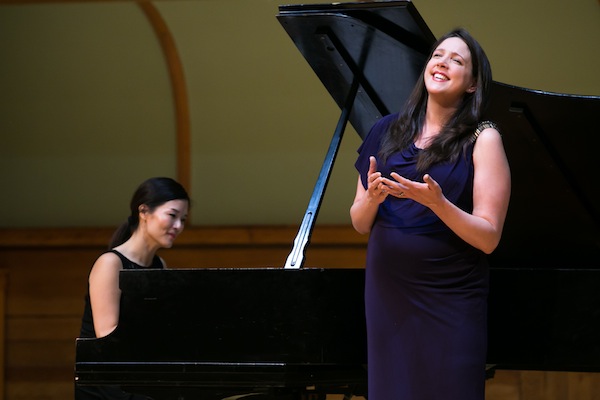Phillips and Huang a close-knit team at Collaborative Works Festival

The format of soprano Susanna Phillips’ performance Thursday night at Ganz Hall was small in scale — a solo recital with pianist Myra Huang. But the intensity of emotion and dazzling technique both artists brought to songs by Samuel Barber, Robert Schumann, Hugo Wolf and Libby Larsen were as sumptuous and engrossing as any grand opera.
The recital was part of the Collaborative Works Festival, a four-day exploration of vocal chamber music sponsored by the Collaborative Arts Institute of Chicago. It’s difficult to imagine a more persuasive argument for the power of collaboration than Thursday’s performance. Huang’s expressive piano was as vital to setting and sustaining the mood on Thursday evening as Phillips’ rich, agile voice.
An alumna of Lyric Opera of Chicago’s young artist training program, Phillips has a thriving operatic career. But she knows how to scale her golden voice and dramatic power to an intimate space like the 195-seat Ganz Hall. Opening with Barber’s Hermit Songs, she drew the attentive capacity audience into the cycle’s medieval monastic world, each of the ten songs a highly individualized character study. Her elegant, polished tone took on maternal tenderness in “St. Ita’s Vision,” a lullaby for a nursing baby Jesus. In “At St. Patrick’s Purgatory,” her wide-ranging vocal line conveyed the alternating resolve and baffled terror of a saint in a crisis of faith. Reaching the top of Barber’s often lyrical vocal lines, Phillips sent up clear, luminous notes that also contained hints of fragility and an air of solitary struggle.
The second half of the program was especially meaty: Hugo Wolf’s four Mignon Lieder, set to poems of Goethe, and Libby Larsen’s Try Me, Good King, set to words spoken by five wives of Henry VIII. The final Mignon song, “Kennst du das Land (“You know that land?”) conjures up the fragrant orchards and craggy peaks of Italy, the kidnapped Mignon’s barely remembered childhood home. In the opening stanzas Phillips was rapt, wandering through Wolf’s melancholy melodic lines like a lost child. In the final stanza, her voice took on the frantic terror of a woman both afraid of returning yet longing for home.
Try Me, Good King bristled with drama. In “Anne of Cleves,” the fourth of the cycle’s five songs, Huang pounded out a series of macabre ditties. As Anne amiably agreed to her politically necessary demotion from Henry’s wife to his “sister,” Phillips’s singsong melody bubbled with barely suppressed giggles. In “Anne Boleyn,” however, Phillips hurled her snarling “Try me!” with all the rightful fury of a proud queen grievously wronged.
In remarks to the audience, Phillips acknowledged the difficulty modern audiences might have with Robert Schumann’s song cycle Frauenliebe und –leben (A woman’s love and life.) The text by Adelbert von Chamisso is the male gaze at its most narrow, a man’s fantasy of a woman ecstatic in her roles as besotted wife and adoring mother whose world collapses in widowhood. But Phillips’s supple, shaded performance found truth both in a young girl’s giddy romantic flights and the crushing weight of a beloved husband’s loss. Phillips is pregnant, and in the sixth song, settling her hands on her belly, she brought radiant, blossoming joy to Schumann’s musings of a mother-to-be.
After a program heavy on high drama, Phillips and Huang lightened the mood with their encore, a deft romp through the extended silliness of Gordon Myers’s Do you sing, Mr. Twain? Composed in 1998, it sets dozens of Twain-isms to music. In “Wagner’s music is better than it sounds,” Huang’s merrily pompous chords evoked images of guests making a grandiose arrival and self-important gods on parade.
In “Eschew surplusage,” Twain’s warning to keep things simple, Phillips sent each syllable through repeated spin-cycles of English madrigal and baroque aria. Her final flirtation with Lucia di Lammermoor’s mad scene threatened to fly hilariously off the rails until an exasperated Huang announced it was time to go home. Reluctantly, the cheering audience agreed.
The Collaborative Works Festival concludes 7:30 p.m. Saturday at Gottlieb Hall. caichicago.org
Posted in Performances




